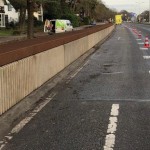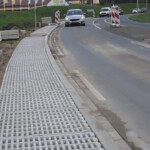Bron: Province of Utrecht
The provincial road N201 at Vreeland is getting an innovative noise barrier, called the Whiswall, for the summer of 2020. The province will use it to try to reduce noise pollution and improve the quality of life for about 60 homes and a primary school.
Noise pollution is bad for our health. That’s why the province of Utrecht is researching ways to improve the quality of life around provincial road N201 in the program Future N201. The Whiswall is part of the province of Utrecht’s Environmental Noise Action Plan, which contains measures to reduce noise pollution in urban and rural areas.
Noise pollution at Vreeland
Vreeland is one of the areas with a lot of noise pollution. Several measures have already been taken in recent years, like applying silent asphalt, lowering the maximum speed, and making the bridge over the river Vecht quieter. However, the noise remains significant. A traditional noise barrier isn’t possible here, because of the location of the road and the lack of space. The new and innovative Whiswall on the other hand, does fit, being lower and taking up less space.
WHISwall
The WHISwall is an innovative steel and concrete construction that deflects sound. The WHISwall is smaller, more compact, and shorter than a conventional noise barrier, meaning it can be placed on the elevated road. The WHISwall will be placed between the bridge over the river Vecht and the junction of the N201 and Singel.
The province of Utrecht wants to gain insight into this new product’s effects and usefulness. The National Institute for Public Health and the Environment (RIVM) will measure and follow the situation before and after the placement, together with residents, the municipality of Stichtse Vecht and the Vreeland town council. They will not only focus on measuring the ‘technical’ dB levels at the road and at homes, but they will also take into account the subjective sound experience with a survey.





